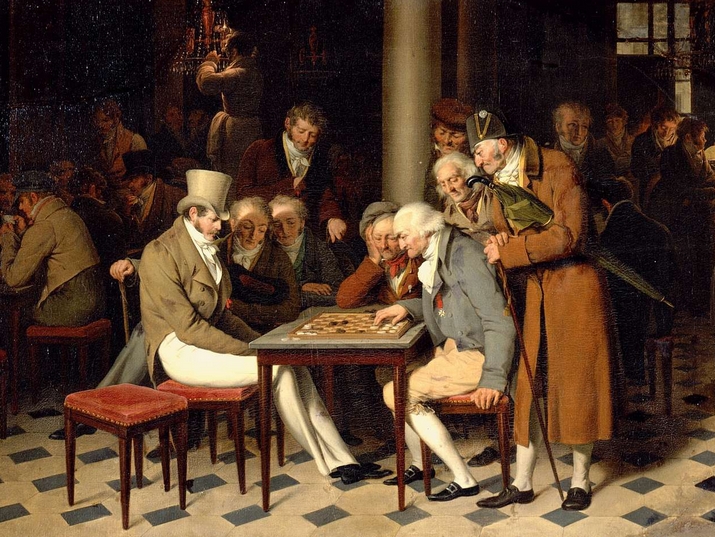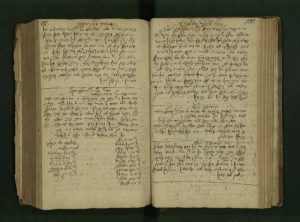Records
from 18th century Prague show that the opening of Jewish coffee houses
on Shabbat enjoyed the approval of the city’s rabbinic leadership.

In the middle of the
eighteenth century, religious life in the Jewish community of Prague was
at its high point, with nine well-known synagogues and dozens of study
houses. But at the same time that the learned men of Prague were
producing vast Torah scholarship and the yeshivas were bustling with
students, another institution was gaining popularity – the coffee house.
Coffee houses became popular soon after coffee’s arrival in Western
Europe, and often offered more than just a drink; they were a place to
spend leisure time playing games and discussing current events with
friends and strangers. Rabbinic sermons and writings from this period
warn of the spiritual threat posed by the coffee house. These
establishments’ diverse environment and leisure culture competed with
the traditional Jewish lifestyle of worship and study.
In spite of this potential culture clash, the records from that time period in the Pinkas Beit Din
– the minute book of the rabbinic court of Prague – show that the
opening of Jewish coffee houses on weekdays and, shockingly to modern
ears, even on Shabbat, enjoyed the approval of the city’s rabbinic
leadership, along with careful, detailed rabbinic-halachic regulation.
The Pinkas (minute book) of the Rabbinic Court of the Holy Congregation of Prague, currently
preserved in the Jewish Museum of Prague, is a hand written book which,
records the decisions of the rabbinic court, one of the most important
governing bodies of the Prague Jewish community. This pinkas,
written in a mix of Hebrew and Yiddish, begins in 1755 and survived the
Holocaust even as the community it records was wiped out, provides
important testimony to Jewish daily life in Europe.

In the Prague Pinkas Beit Din,
the numbers alone – seven discussions about coffee houses within
fifteen years – tell us how pressing and how complex this issue was. The
entries show a swift progression, from disapproval and severe
limitations to support with minimal caveats. Evidently community members
had embraced coffee-house culture and were not about to give it up. The
pinkas entries also show the style of religious leadership adopted by
the rabbinic courts of Prague in this case: instead of opposing a
cultural trend that threatened traditional life, the rabbis accepted the
new trend, which gave them the opportunity to regulate and contain its
impact, and to integrate the new institution into the traditional mode
of Jewish life.
One of the first discussions in the pinkas,
from around 1757, begins by taking a hard line – Ideally the coffee
houses in the Jewish ghetto should be closed, and people should instead
dedicate their time to Torah study. Since that is impossible, they
should open only for an hour in the morning, after morning services at
synagogue, and then for an hour following afternoon services. Women
should never enter coffee houses. With regard to Shabbat, “no man should dare to go to the coffee house and drink coffee there on the holy Sabbath. This is punishable with a large fine!”
This discussion is followed by another paragraph, presumably added days or weeks later:
However, due to the travails of war (presumably the siege of Prague in the spring of 1757, part of the Seven Years War)
and other concerns, many have protested that we cannot be so stringent
on this matter… the way to distance from sin will be that on the holy
Sabbath, no one should go to the coffee houses to drink coffee, but
anyone who wishes to drink should bring it to his home. And on weekdays,
any time they are praying in the Old New Synagogue (Altneuschul), no
man should dare go drink in the coffee house.
The added paragraph shifts the balance significantly, permitting Jews to frequent coffee houses at all times except
during prayers; allowances are made for procuring coffee on Shabbat as
well. Apparently the Jewish coffee sellers had an arrangement in which
customers paid before or after Shabbat, and they could prepare the
coffee without violating Shabbat laws about cooking, perhaps with the
help of non-Jewish workers. The main concern is the propriety of
spending time in the coffee house on Shabbat, so getting the coffee as
takeout is a suitable compromise, but not one that lasted long.

The next two entries on this topic in the pinkas,
dated 1758 and 1761, are each signed by eight Jewish coffee house
owners. One declares that coffee will be sold only until noon on
Shabbat, and one states that coffee will be sold without milk on
Shabbat, presumably in order to avoid serving dairy to customers who had
just eaten a meat meal.
A fourth entry, dated 1764, declares:
From this day
onwards, on Shabbat and holidays, women are not to enter coffee houses
to drink coffee at all. And even on weekdays, from 6 PM onwards, no
woman or women should be found in the coffee house…
These entries assume
that, despite earlier restrictions, women are indeed entering coffee
houses. Moreover, coffee houses are not only providing coffee for
takeout on Shabbat, customers are sitting and drinking coffee there, and
the rabbinic court is only trying to limit that clientele to men.
A fifth entry, dates 1774, states:
The owners of the
coffee houses stood before the rabbi and the rabbinic court, who warned
them that they should be careful to avoid selling coffee on Shabbat and
holidays to non-Jews, as the prohibition of commerce on the Sabbath
applies. They are permitted to sell only to Jews, for the sake of Oneg
Shabbat, delighting in the Sabbath day, since not everyone is able to
prepare coffee for himself on Shabbat at home.

To the rabbis of
eighteenth century Prague, the coffee house’s ambiance of levity and
cultural exchange competed with the traditional understanding of the
proper Shabbat atmosphere. The rabbinic court therefore made efforts to
restrict Jewish coffee houses’ activity on Shabbat, with limited
success. But in their final entry on this topic, the Prague Beit Din
provided the coffee houses with a religious stamp of approval, pointing
out that Jews attending coffee houses on Shabbat was in fact a
fulfillment of the religious injunction to delight in the Sabbath day.
The rising cultural significance of coffee in European regions, since
its import a few decades ago, is now reflected in the the pinkas; the
new product is incorporated into halachic language, labeled, for the
first time, as “Oneg Shabbat” – a positive value which should be
carefully considered. The coffee house and the synagogue need not
always be rivals: within certain parameters, both could be part of a
meaningful and enjoyable Sabbath day in Prague.
The National Library
of Israel, together with the Central Archives for the History of the
Jewish People in Jerusalem, holds the largest collection of pinkasim in
the world. Through international academic co-operation, the Pinkasim Collection
aims at locating, cataloguing, and digitizing all surviving record
books, making them freely available. At the first stage of the project,
the focus is on pinkasei kahal, the pinkasim of the central governing
body of Jewish communities. On June 20th, the National Library will host an event marking the launch of the Pinkasim Collection, which will feature experts from around the world, and will include a lecture by Maoz Kahana about coffee houses in Prague.



9 comments:
https://www.theguardian.com/society/2019/may/02/child-sexual-abuse-inquiry-to-be-held-religious-organisations
Child sexual abuse in a wide range of religious organisations and settings is to be scrutinised in an official inquiry.
The investigation by the independent inquiry into child sexual abuse (IICSA) will review child protection and policies in organisations belonging to nonconformist Christian denominations, Baptists, Methodists, Islam, Judaism, Sikhism and Hinduism.
The investigation will also cover religious settings such as mosques, synagogues, churches and temples. Places where children are taught about faith, such as Muslim madrasas and Christian Sunday schools, will be investigated, along with faith-based youth groups and camps.
The investigation is separate from the inquiry’s ongoing examinations of child protection and abuse in the Anglican and Roman Catholic churches.
More than one in 10 survivors of child sexual abuse who contacted the inquiry’s truth project reported sexual abuse in a religious institution. Of those, almost a quarter said they had been abused in religious organisations included in the latest investigation.
They described a culture of cover-ups and lies, with senior members of the organisation discouraging victims from coming forward for fear of bringing “reproach” and being exiled from the congregation and their families.
The IICSA was set up in 2015 to investigate institutions that failed to protect children from sexual abuse. It has held several hearings into abuse in the Church of England and Catholic church.
Justin Welby, the archbishop of Canterbury and leader of the Church of England, and Vincent Nichols, the archbishop of Westminster and most senior Catholic cleric in England and Wales, have both given evidence in person, apologising for abuse and its cover-up.
The inquiry will hold a preliminary hearing into religious organisations in July, with public hearings planned for next year.
Typical Chiloni propaganda. Misleading headline with a picture of batlonim inside the coffee house to make it seem every Shabbos was some big party when the Prague beis din was only mattir picking up the coffee to take home. And they ignore the fact that extant teshuvah seforim are clear that hanging out in coffee house was assered week round by poskim in other cities.
Query: What were the arrangmements for ensuring the kashrut at the coffeehouses?
Interesting how the rabbis allow something they previously ossered when they find a way in which they (or their sons-in-law) can make money from the evil technology.
Cui bono?
My educated guess is that the people in charge of this aisek started feeling old & lethargic, regardless of what the weather forecast was
https://www.jta.org/2019/06/19/opinion/the-catholic-church-has-finally-gotten-serious-about-handling-sexual-abuse-heres-what-jewish-institutions-could-learn-from-the-process
The Jewish community has, unfortunately, not had the same public reckoning.
Prior to October 2017, when stories about sexual harassment within the Jewish community exploded, Dr. Guila Benchimol, a sociologist who specializes in sexual victimization in religious communities with a focus on Jewish communities, told me that there had been conversations about an accreditation system within the Jewish world, including centralized reporting and accountability structure – but they have not yet come to fruition.
https://www.ktre.com/2019/01/31/weathers-cold-jokes-are-hot/
Fishman, who da hell is dis dabrrrunis Benchimol? Mirrr darrrfen vissen velcherrra "victims" she talking mit. Dee hust episs a list fin zee?
https://www.washingtonpost.com/national/health-science/meet-the-new-york-couple-donating-millions-to-the-anti-vax-movement/2019/06/18/9d791bcc-8e28-11e9-b08e-cfd89bd36d4e_story.html
After the scandal of taking money unteren tish in Philly to kasher mamzerus it's no surprise that journalists have tracked down this source for most of the money funding the anti-vaxx insanity in heimishe kreizen.
The meshuggener propagandist Del Bigtree (Grossbaum?) is an employee of hedge fund titan Bernard Selz born in France before the Nazis invaded, who has his Italian shiksa wife providing millions in expense money to fly Bigtree around to Monsey & Boro Park and this can explain who rented the Atrium & Ateres Chynka and paid for PEACH publications.
The mother of Bernard Selz is a Steindecker who they are not just ayneklach of the Levush & other gedolim r"l but they go back in the Frankfurt kehilla over 500 years. Many of the big names in the KAJ kehilla are their cousins.
We'd love to hear which "posek" it was that Sholom Kaminetzky may have pulled out of his hat to whitewash this gelt from such a shmootzikeh mekor.
If anyone has a problem with mayseh Zimri from the Frankfurt kehilla they will have to go through me first!
Yo, Dr. Kissinger! Wassup?
I might not be a Yekke but we can all get together on this to monn schar like Pinchos while we put the SHQUEEZE on!
Post a Comment